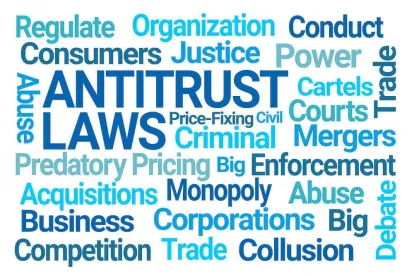Federal Trade Commission (FTC)
FTC to study impact of physician group and health care facility mergers
FTC approves final order imposing conditions on combination of Pfizer Inc.’s Upjohn and Mylan N.V.
As part of its Merger Retrospective Program, on Jan. 13, 2021, the FTC issued an Order to File a Special Report to six health insurance companies. The FTC plans to use information gathered through the Special Report (e.g., patient-level data from 2015 to 2020) to analyze the competitive impact of physician and health care facility consolidation, as well as mergers and acquisitions, in markets for health care services.
On Jan. 28, 2021, the FTC announced its final order approving the combination of the Upjohn division of Pfizer Inc. and Mylan N.V. in a spinoff, forming Viatris Inc. The FTC alleged that the proposed acquisition would harm competition in generic drug markets. The final order requires the parties to divest certain rights and assets in seven current generic drug markets as well as FTC approval for any future transactions involving three developing generic markets.
Following FTC staff recommendation to challenge the transaction, Tronox Holding plc. abandons proposed acquisition of TiZir Titanium and Iron.
The Department of Justice (DOJ). In May 2020, Tronox Holdings plc announced its intention to acquire TiZir Titanium and Iron (TTI) from Eramet S.A. Tronox is a producer of titanium oxide pigment, and TTI produces chloride slag, which is an input to the product. On Jan. 4, 2021, Tronox issued a press release stating that the British Competition and Markets Authority, which was examining whether the proposed transaction would foreclose the supply of chloride slag for competitors, planned to open a Phase 2 investigation into the proposed transaction. Given that investigation, on Jan. 18, 2021 Tronox announced it was terminating the acquisition agreement, and on Jan. 29, 2021 the FTC closed its investigation of the proposed acquisition.
Visa and Plaid abandon merger after Antitrust Division’s suit to block.
Health care company indicted for labor market collusion
On Jan. 12, 2021, Visa Inc. and Plaid Inc. abandoned their proposed merger following DOJ filing suit in November 2020 to block the transaction. Plaid, whose products enable customers to share their financial information with apps and services, is developing its own payments platform. The DOJ complaint alleged that Visa is a monopolist in the online debit industry, that Plaid is an innovative, nascent competitor, and that the proposed transaction would eliminate Plaid as a competitor before Plaid had a chance to succeed.
On Jan. 7, 2021, Surgical Care Affiliates LLC, an owner and operator of outpatient medical care centers, was indicted in a two-count federal grand jury indictment under the Sherman Act for conspiracy and agreements not to compete with competitors regarding the solicitation of senior, high-level employees from approximately 2010 to 2017. This is the first indictment in an ongoing investigation of such employee allocation agreements. According to DOJ Assistant Attorney General Makan Delrahim, the charges “demonstrate the Antitrust Division’s continued commitment to criminally prosecute collusion in America’s labor markets.”
DOJ concludes its investigation of D.C.-area private high schools’ decision to stop offering Advanced Placement courses.
DOJ issues positive business review letter to companies developing plasma therapies for COVID-19.
In June 2018, several Washington, D.C.-area private schools announced that they had planned to stop offering Advanced Placement (AP) courses by 2022. DOJ, on Jan. 11, 2021, announced that although it was investigating this collective decision as a potential violation of the Sherman Act, as a result of the schools’ representations that they are not bound by any agreements and would refrain from entering into any agreements in the future with other schools relating to AP curriculum offering, DOJ would exercise prosecutorial discretion and not bring an enforcement action.
Baxalta US Inc., Emergent BioSolutions Inc., Grifols Therapeutics LLC, and CSL Plasma Inc., which are plasma collection companies, proposed to participate with the Biomedical Advanced Research and Development Authority to design standards in COVID-19 convalescent plasma collection. DOJ, reviewing the proposed collaboration under its business review letter process, announced on Jan. 12, 2021, that it did not intend to challenge the proposed collaboration, based on its conclusion that the collaboration would help to treat COVID-19.
DOJ issues business review letter for proposed university technology licensing program.
In another business review letter, DOJ on Jan. 13, 2021, announced that its review of University Technology Licensing Program’s (UTLP) proposed joint patent licensing among participating universities (specifically, with respect to their physical science patents relating to certain emerging technologies), was unlikely to harm competition, reasoning that the proposal helps universities commercialize inventions for the benefit of the public. UTLP also agreed to put in place competitive safeguards as part of the proposed program.
DOJ issues favorable business review letter to Institute of International Finance for sovereign debt information sharing principles
Foreign-language training companies admit to participating in conspiracy to defraud the United States
On Jan. 19, 2021, DOJ announced felony charges against Comprehensive Language Center Inc. and Berlitz Languages Inc. for allegedly participating in a conspiracy to defraud the United States related to bidding on a foreign-language training contract for the National Security Agency (NSA). The charges allege that the parties submitted false information to the NSA as part of the bidding process, hindering the competitive bid process. Relatedly, DOJ announced deferred prosecution agreements with the parties admitting participation in the conspiracy, agreeing to cooperate fully with the investigation, instituting ethics programs designed to prevent future problems, and paying fines including criminal penalties and victim compensation.The Institute of International Finance (IIF) sought a DOJ business letter review for its plan to establish voluntary guidelines designed to enable public disclosure of information relating to sovereign debt issuance. DOJ concluded that the guidelines were unlikely to harm competition in part due to various competitive safeguards, reasoning that more transparency in the area would help with more efficient pricing.
U.S. Litigation.
In re La. Real Estate Appraisers Bd., US Sup. Ct. Dkt. No. 9374; La. Real Estate Appraisers Board v. FTC, Case Number 19-30796 (5th Circuit).
McCarthy et al v. Intercontinental Exchange, Inc. et al., Civil Action No.: 3:20-cv-05832 (N.D. Cal.)
The Louisiana Real Estate Appraisers Board has asked the U.S. Supreme Court to rule that appellate courts may quickly dispense with antitrust allegations against “unquestionably public bodies,” rather than forcing such entities to wage lengthy battles in district or federal administrative courts first.
The FTC first filed the administrative complaint against the appraiser board in 2017, asserting that the Louisiana appraiser board, “a state agency controlled by licensed real estate appraisers, has unreasonably restrained price competition for real estate appraisal services.” The FTC contended that the board carried out this price-fixing through its regulation of fees paid to appraisers by appraisal management companies and through its enforcement actions – while being controlled by the board’s eight appraiser members, who allegedly had private interests in higher fees.
One of the Louisiana board’s asserted defenses was something called “state-actor immunity.” Under this defense, the Louisiana board argued that the alleged anti-competitive actions of the board and its members were not illegal because they were state government-sanctioned actions and policy decisions. The FTC’s counter to the defense was that the protection did not apply because the Louisiana board was controlled by “market participants” – i.e., private appraisers with an interest in the outcome. When the FTC ruled that the appraiser board could not rely on the defense, the board challenged the ruling by suing the FTC in federal court and asking the federal court to overrule the FTC. The Fifth Circuit Court of Appeals recently ordered the board’s court case be dismissed and the FTC’s administrative proceeding go forward.
The board filed a motion for a rehearing, which the Fifth Circuit denied. In response, the board first sought high court intervention in December 2020, asking the court to stay the FTC action. Justice Alito refused to issue the emergency stay. In January 2021, the board filed a petition for certiorari, arguing that the Supreme Court should take the case now because, “Layering a restrictive jurisdictional limitation on immediate appeals on top of N.C. Dental’s limitation on the set of government entities that will obtain immunity on the merits will leave unquestionably public bodies exposed to the threat of federal antitrust suit, without the ability to get a definitive answer on their immunity from a court of appeals until it is too late.” The board further warned that the “predictable result” of denying immediate appeals would mean more government boards forced to settle under threat of litigation from private plaintiffs or government enforcers. Enforcers like the FTC, it warned, would have “the unique power to delay any neutral decisionmaker from reaching the immunity question until after expensive proceedings have concluded.
Several of the world’s biggest banks have asked a U.S. federal district judge not to immediately terminate the Libor interbank offered rate in response to a lawsuit filed by borrowers contending that the benchmark was the product of a “price-fixing cartel.” The plaintiffs, which include 27 consumer borrowers and credit card users, are also seeking monetary damages. Defendants in the case contend, in a November filing, that an injunction abruptly ending Libor would “wreak havoc” on financial markets and undermine years of work seeking to reform the reference rate. A San Francisco judge has said he will render a decision on the banks’ motion for an injunction without a hearing. The judge held a hearing, however, earlier in January on a request by the banks to transfer the case to Manhattan federal court; the judge has not yet decided that motion.
Libor is derived from a daily survey of bankers who estimate how much they would charge each other to borrow. It has been used throughout the world in determining the cost of borrowing in many types of loans, such as student loans, mortgages, interest-rate swaps and collateralized loan obligations. For over three years, policymakers around the globe have been developing new benchmarks to replace Libor by the end of 2021. In November, officials proposed an extension for some dollar Libor tenors until mid-2023, to help firms manage the transition process.
The borrower plaintiffs want Libor either to be prohibited or to be set at zero, with borrowers repaying capital but not interest. The banks contend, in their November filing, that the plaintiffs have not shown that they paid interest based on Libor, and that the suit is built on “baseless theories of antitrust liability.” The banks also say that regulators have warned that even a temporary disturbance of Libor “could devastate” financial markets. The banks further argue that “Plaintiffs allege that the highly regulated process of setting a benchmark that is a fundamental part of the global economy is a per se antitrust violation. . . But legitimate cooperative activities, even those involving competitors, often benefit competition.”







 />i
/>i
